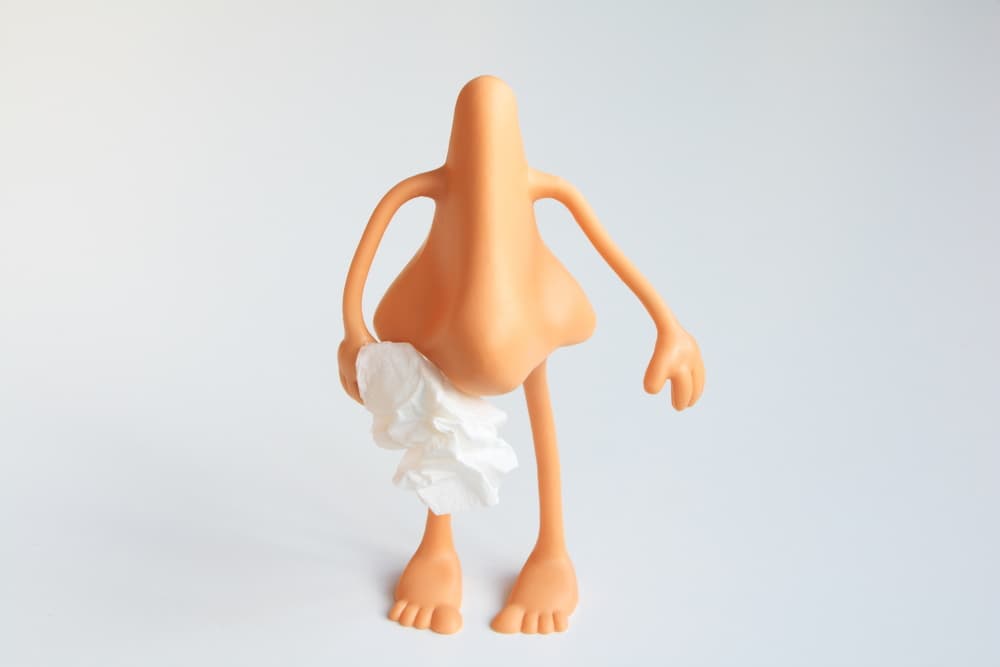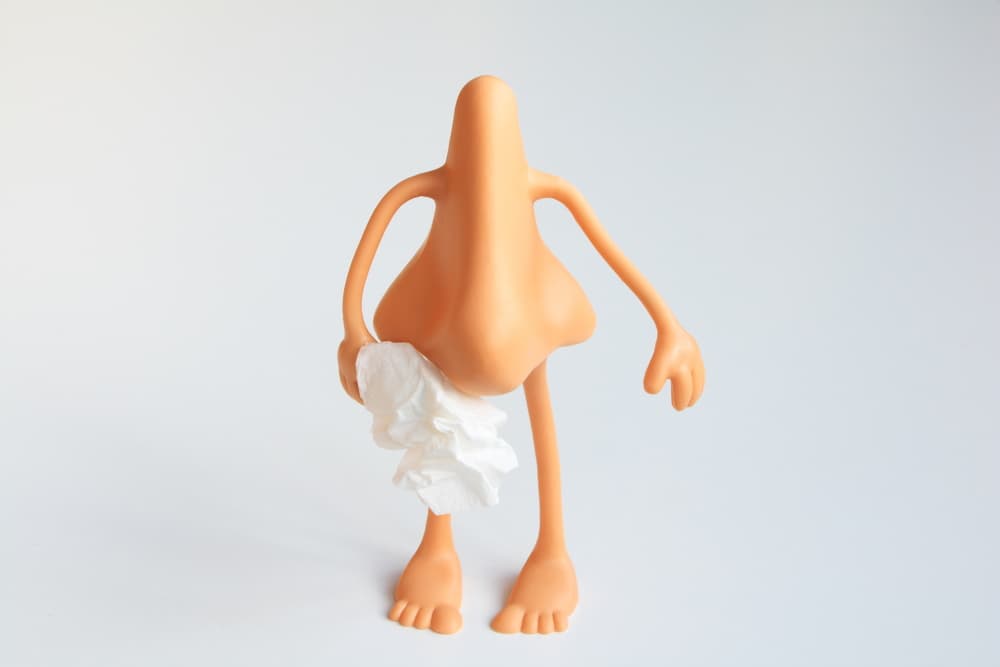Causes and Remedies for Stuffy Nose
July 24th, 2023 | 5 min. read


We’ve all experienced a stuffy nose at some point in our life, the feeling of a blocked nose that all of the nose-blowing in the world won’t fix. For some of us, we get stuffy noses before or during a cold, for others it’s seasonal, and sometimes, we may have a stuffy nose for no reason we can pin down.
While having a stuffy nose can be irritating, they’re generally harmless. They require us to pack some tissues with us throughout the day to prevent further discomfort and dripping of the nose, but for the most part, they’re not a big issue.
That being said, being congested is still annoying, especially when it doesn’t seem to go away, so you may be wondering how to get rid of a stuffy nose and want to learn more about remedies for nasal congestion. If that’s the case, read on to learn everything you need to know about the causes and remedies for a stuffy nose.
GET YOUR STUFFY NOSE EVALUATED AND TREATED TODAY!
Please schedule an appointment for your sore throat consultation at any of our ten convenient locations in Houston, TX, today.
Common Causes of a Stuffy Nose
There are countless causes of a stuffy nose but there are a few common causes that make up for the majority of stuffy noses. These include:
- Sinus infections, a cold, and the flu are common causes of a stuffy nose. You may experience a stuffy nose before you start to feel other symptoms of the infection and they can last for the duration of the cold or flu.
- Allergies, especially seasonal allergies, can cause a stuffy nose. The changing seasons and exposure to more allergens like pollen can irritate the nose and result in a stuffy nose. Allergic rhinitis, also called hay fever, is a reaction to particles in the air (allergens). Common allergens include dust, pollen, pet dander, and mold.
- Irritants in the air can cause the mucus membranes in your nose to become irritated and inflamed, resulting in a stuffy nose. This is also called non-allergic rhinitis. Such irritants include:
- Tobacco smoke
- Perfume
- Dust
- Car exhaust
- Paint fumes
- Non-allergic rhinitis may also be triggered by other factors including:
- Medications, especially medications used for pain or blood pressure
- Hormonal changes, like going through puberty or pregnancy
- Enlarged adenoids, the glands that sit behind the nasal passage can swell, resulting in nasal congestion.
- Other causes of a stuffy nose:
- Alcohol
- Churg-Strauss Syndrome
- Dry or cold air
- Using too much decongestant nasal spray
- Certain foods, especially spicy foods
- Deviated septum
- Gastroesophageal reflux disease (GERD)
- Nasal polyps
- Objects in the nose
- Sleep apnea
- Thyroid conditions
Effective Remedies for Nasal Congestion
Nasal congestion often goes away quickly, especially if you’re experiencing a stuffy nose during a short-term cold, but other times it can last for too long. Either way, chances are you want to know how to relieve a blocked nose and start feeling better.
Luckily, there are several remedies you can try out to clear your nose.
Nasal Sprays: When you get a stuffy nose, some of the most effective treatment options are nasal sprays. For non-allergic rhinitis, you may be prescribed a saline spray to rinse out the inside of your nose to clear it of mucus, corticosteroid nasal spray to reduce inflammation and swelling in the nasal passage, ipratropium bromide spray to reduce the dripping of the nose, and antihistamines (allergy medicine).
For allergic rhinitis (allergic reactions to irritants in the air), antihistamines and corticosteroids may also be prescribed in addition to decongestant nasal sprays that can help relieve your stuffy nose and anticholinergic nasal sprays to eliminate excess mucus in the nose. However, when using decongestant nasal sprays, it is important to never overuse them by never using them for more than three days in a row, the result could be an even stuffier nose.
Antibiotics: Antibiotics are used to treat nasal congestion when a bacterial infection is resulting in nasal blockage.
Other medication: Mucus-thinning medication and antihistamines are other common treatments for nasal congestion. Both should clear the nose and result in unblocked nasal passages.
Steam Inhalation: Steam inhalation is a common home remedy that can help with nasal congestion. You can take a hot shower, breathe in the steam from a boiling pot of water (if you’re careful!), or use an essential oil diffuser. Breathing in the steam will soothe your nasal passages and may help you discharge any stuck mucus and clear your nose.
Nasal rinses: Nasal rinses can also help clear a blocked nose by rinsing out mucus similar to a saline spray. A common home nasal rinse device is the Neti Pot.
Tips for Preventing and Managing Nasal Congestion
There are several things you can do at home to prevent and comfort nasal congestion, including the below.
Use a humidifier. Dry air is one cause of nasal congestion. So if you live in a dry climate, try using a humidifier in your bedroom to reduce your chances of getting congested while you sleep. Furthermore, using a humidifier after your nose is already congested is a great way to reduce pain and irritation from your congested nose.
Stay hydrated. Whether you’re healthy or you’ve just gotten sick, it’s always vital to stay hydrated. Staying well hydrated while you’re sick will help you feel well faster and staying hydrated while you’re well will decrease your chances of getting sick in the first place. Staying hydrated will help thin out the mucus in your nose and reduce the pressure on your sinuses.
Keep your head elevated in bed. When you sleep, it’s important to keep your head elevated on a pillow to reduce the chances of getting nasal congestion overnight. Lying flat can cause mucus to build up in your sinuses while increasing sinus pressure, resulting in poor sleep quality and a stuffy nose.
Therefore, prop your head up at night to keep your head elevated above your heart. This sleeping position will simultaneously help you sleep better and reduce your chances of experiencing nasal congestion.
Consider pain medication. If you’re experiencing pain from your stuffy nose due to sinus pressure, you may want to consider over-the-counter pain medication to manage your symptoms. If your pain is serious, speak to your doctor about your symptoms and treatment options.
Get good sleep. Getting good quality sleep every night is one of the best things you can do to prevent infection and promote physical and mental wellness. Did you know that sleep helps the body heal? When you sleep, your brain releases hormones that encourage tissue growth, allowing your body to heal itself.
Rest. When you’re resting, your body is able to create more white blood cells to fight off infection. Try resting more, especially before bed to promote healthy sleep. Avoid activities that keep you active and awake and opt for more relaxing and restful ones.
When to Seek Medical Help for a Stuffy Nose
A stuffy nose is generally a relatively harmless symptom of an infection, allergies, or exposure to irritants in the air. But sometimes, a stuffy nose can be indicative of another more serious problem.
So if you find that your stuffy nose is persisting longer than a week, your symptoms worsen over time, or you experience serious pain, you should seek medical help as soon as you can.
Conclusion
A stuffy nose can be bothersome and irritating, sometimes even painful. Luckily, most stuffy noses have quick fixes and easy treatments. If you have a mild stuffy nose with no other symptoms, you’re welcome to try any of the remedies we’ve noted above. That being said, it’s always best to get it checked out with a doctor, especially when it persists.
Look to Houston ENT & Allergy for All of Your Ear, Nose, and Throat Needs!
When it comes to stuffy noses and other ear, nose, throat, and allergy problems, you should choose the expert doctors at Houston Ear, Nose, Throat, & Allergy.
At Houston ENT, we’ve been providing outstanding ENT, allergy, and hearing care to the greater Houston community since 1907. Don’t let that stuffy nose get any worse, book an appointment with one of our amazing doctors today!
Topics:
